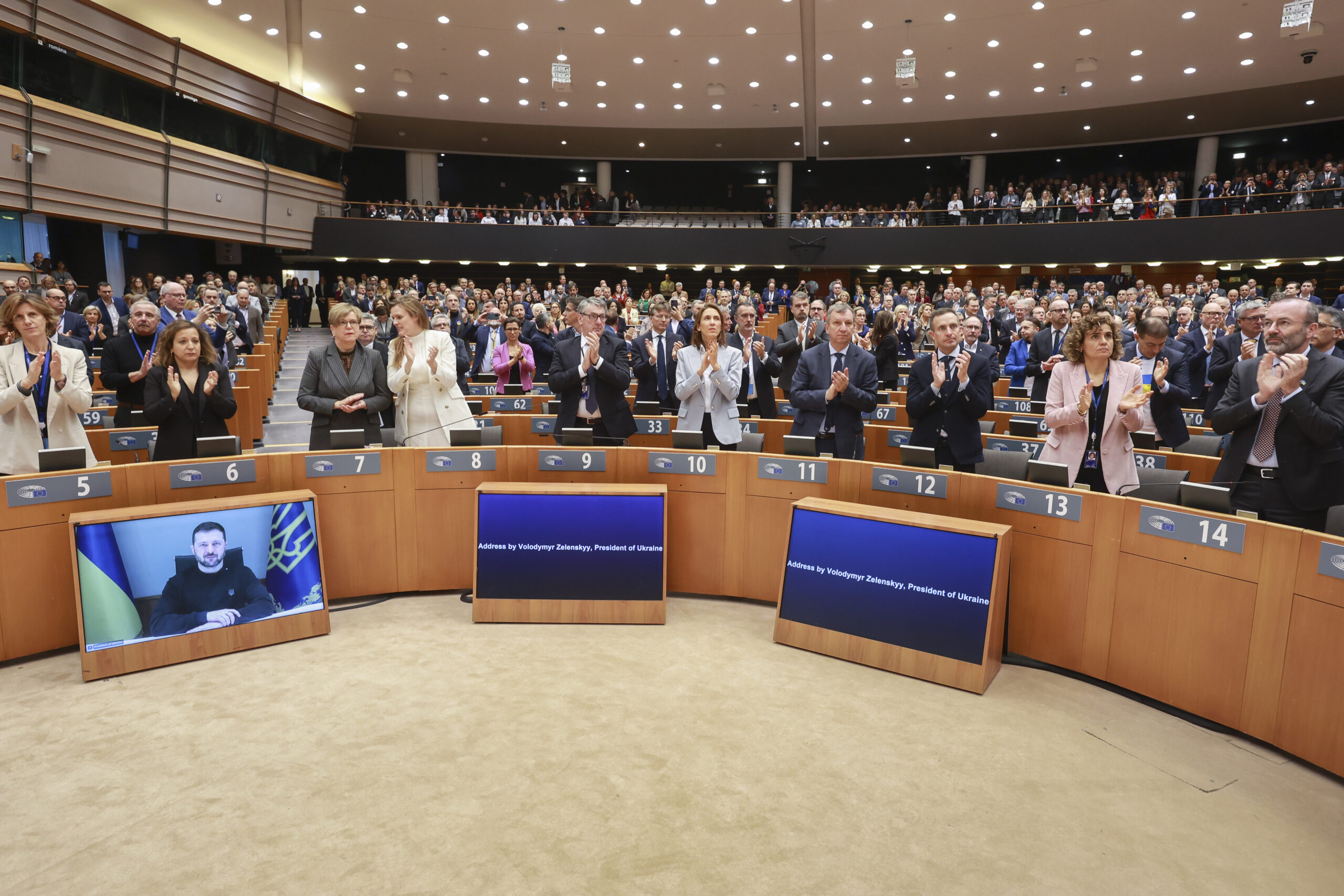Brussels – One thousand days after the start of Russia’s invasion of Ukraine, escalating attacks by Moscow—and the bogeyman of U.S. disengagement under Trump—confront the EU with fundamental choices. Today (Nov. 19), as Volodymyr Zelensky addressed the European Parliament meeting for the sad occasion, for the first time, Kyiv used U.S. missiles against a military target on Russian territory. On the hesitancy of several EU capitals to follow Joe Biden’s example, Zelensky said, “Do not be afraid to give more now.”
The moment is decisive. While the first cracks are appearing in the West in the hitherto steadfast support for Kyiv’s resistance, the alliance of autocrats linking Vladimir Putin, Iran, and Kim Jong-un’s North Korea is now in the sunlight—with Beijing’s complicity. “Putin is focused on winning this war,” said the Ukrainian leader remotely connected to Brussels, claiming that the North Korean contingent already stationed in Russia “may reach 100,000 soldiers.”
But “even with Kim Jong-un on his side, Putin remains smaller than the strength of united Europe,” Zelensky spurred MEPs. The Ukrainian president, aware that Trump’s return to the White House will likely increase the front of those who want to negotiate with the Kremlin, continued: “We must push Russia toward a just peace.” To do so, Kyiv must sit at the table from a stronger position. According to Zelensky, Moscow “will not engage in meaningful negotiations before its ammunition depots, military logistics, and air bases are destroyed.” The message is clear: the 27 must overcome their reluctance and allow Kyiv to use European weapons to attack military targets on Russian territory.

The Ukrainian head of state also stressed the importance of the sanctions policy: “In these one thousand days, it has been crucial to radically reduce Russia’s ability to finance this war through oil sales, the lifeblood of the Putin regime,” he said. Before him, EU Parliament’s President Roberta Metsola reiterated that for the Brussels Chamber, a “true peace based on justice” can only start with “nothing about Ukraine without Ukraine.” Earlier in the morning had come the message of Ursula von der Leyen, who, in a video message, assured Ukraine’s allies that “European and Western support will keep coming: €50 billion until 2027 from the European Union and $50 billion until 2026 from the G7 countries and the European Union.”
European Majority Calls for More Arms for Kyiv, Patriots Negotiations with Putin
In the European Parliament, leaders of political groups spoke after the ovation for Zelensky. For Manfred Weber, chairman of the European People’s Party, the EU must “first of all talk to our American friends.” And then “take more responsibility” to make sure that Ukraine “wins on the battlefield.” A direct message at home to German Chancellor Olaf Scholz: “Please deliver to Ukraine the Taurus missiles it needs,” Weber said in the hemicycle. An appeal relaunched by her Socialist counterpart, Iratxe Garcia Perez: “Wars are not won by force of speech alone,” said the S&D group leader, “but with ammunition, tanks, anti-aircraft artillery. Garcia Perez issued a provocation to all leaders who are wavering on the green light to strike Russian territory: “If the EU were attacked tomorrow by Russia, would we be here wondering if it is legitimate to counterattack?”
The EU Parliament speaks almost in unison in support of Ukraine. From the Renew Liberals to the Greens to the ECR Conservatives, the line is the one drawn by the two big moderate political families, Social Democrats and Populars, put in black and white by the September resolution by which MEPs called on member countries to lift restrictions on the use of weapons on Russian territory.
Renew’s group leader, Valerie Hayer, pointed the finger at those who “in this Parliament claim to be pacifists, but are Putin’s allies.” A front led by the sovereignists of the group founded by Viktor Orban, the Patriots for Europe. Accusations were denied by Hungarian Fidesz MEP Kinga Gal, who recalled that Budapest “is carrying out the largest humanitarian aid operation in history,” hosting “more than 1.4 million Ukrainian asylum seekers who are given housing, healthcare, and education.”
For the vice president of the sovereignist group, “it must be recognized that the European strategy has not yielded the desired results and has not ended the war.” And gets back there, to that front reinvigorated by Trump’s promises to end the conflict. We need “a ceasefire and peace negotiations as soon as possible,” Gal continued, “it is good that more and more voices are rising for a diplomatic solution, with Trump’s election we have a new opportunity.”
English version by the Translation Service of Withub








